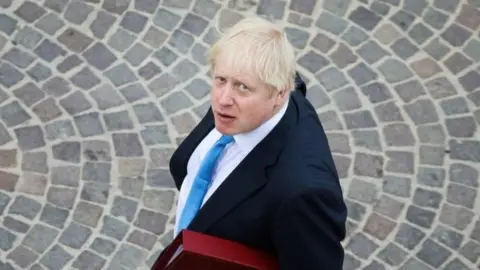Can no-deal Brexit be stopped?
 AFP/ Getty Images
AFP/ Getty ImagesPrime Minister Boris Johnson has said the UK will leave the EU on 31 October "do or die" - even if it means walking away without a deal.
Many people oppose a no-deal Brexit, with MPs planning action in Parliament and others taking to the courts. But can no deal be stopped now that the government has decided to suspend Parliament?
How could the PM make no deal happen?
 AFP/Getty Images
AFP/Getty ImagesA no-deal Brexit means the UK would immediately leave the EU with no agreement in place about the "divorce" process - or how they separate.
There are three ways to avoid this happening on 31 October: MPs could pass a deal, postpone the date of exit, or cancel Brexit altogether.
But unless a new plan is agreed, Mr Johnson does not need to do anything for a no-deal Brexit to happen.
This is because the UK's departure on 31 October is already written into law. He could just run the clock down.
However, it's not as simple as that.
Most MPs in the UK Parliament are against leaving without a deal. And they could try to stop it from happening.
What can MPs do to stop no deal?
 AFP/Getty Images
AFP/Getty ImagesDespite having little time, MPs still have options for trying to block a no-deal Brexit.
Passing a new law that would force the PM to request an extension has emerged as the preferred course of action.
What happens in Parliament is usually up to the government, so MPs have to find a way to wrest control of the timetable.
Emergency debate
Expect to hear about an "SO24" this week. This refers to Standing Order No. 24, the rule that allows MPs to ask for an emergency debate.
These debates usually have no power to force action.
On Tuesday, however, a cross-party group of MPs are using SO24 to take control of Parliament's timetable on Wednesday and put forward legislation.
They want Brexit to be delayed until 31 January, unless MPs had approved a new deal, or voted in favour of a no-deal exit, by 19 October.
It would usually take weeks for legislation to pass through both Houses of Parliament. But the proposers of the new bill expect to be able to pass all stages and have it signed off by the Queen by Monday, before parliament is shut down (or prorogued).
Tory rebels have been warned they face expulsion from the party and deselection if they support the cross-party legislation. But a number have said they will do so, or are not standing at the next election anyway.
One hurdle could come in the House of Lords. Although opponents to no deal have a large majority, peers wanting to block a piece of legislation could talk and talk until there is no time left.
Vote of no confidence
Seen by some as the "nuclear option", MPs have the option to vote out the government.
If a majority of MPs vote against the government, a formal process kicks off under the Fixed Term Parliaments Act:
- A period of 14 calendar days allows the PM to prove he holds the confidence of Parliament
- During this time, if another MP can prove they hold the support of a majority of MPs, the current prime minister is expected to give way
- If no government has been formed after 14 days, a general election will be triggered
If this were to happen before Parliament is suspended, MPs would have much fewer than 14 days to try and form an alternative government. Once Parliament is prorogued, time would be up and we would slide towards a general election.
Pass a deal!
It is still possible for MPs to approve a deal before exit day. This is the course of action ministers say they prefer.
The PM could return from the EU summit in mid-October with a brand new deal, propose it to MPs and get it passed in time for the 31 October deadline.
But the main hurdle here - aside from persuading a majority of MPs to back him - would be whether he has enough time to pass the legislation that is needed to implement the deal.
Use the courts
It isn't just Parliament which could get in the way of the PM's prorogation plans - a number of legal challenges are making their way through the courts.
In Scotland, a judge has refused to order a temporary halt to plans to shut the UK Parliament. But a further hearing of the case is to be held on Tuesday.
The action is being taken by a cross-party group of 75 politicians, who want the court to rule that prorogation would be illegal and unconstitutional.
 EPA
EPACases are also being started in Belfast and London, both seeking injunctions to block the closure of Parliament.
Northern Irish campaigner Raymond McCord is waiting to hear the result of his challenge.
And Sir John Major is joining forces with campaigner Gina Miller. The former Conservative prime minister believes Parliament is being closed to prevent MPs from opposing a no-deal Brexit.
If any injunction to block prorogation is granted, the government would immediately appeal and the cases could end up in the Supreme Court.
